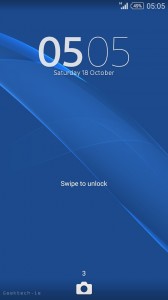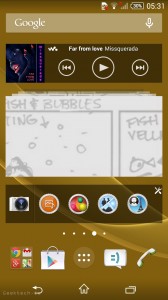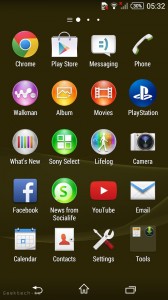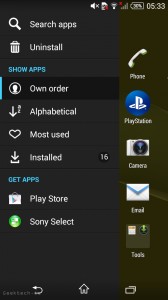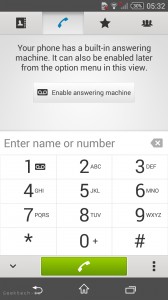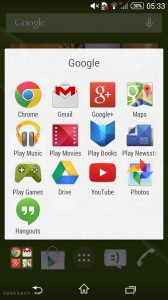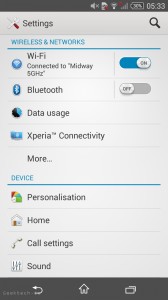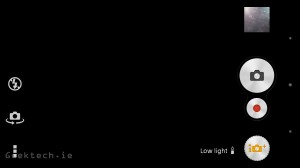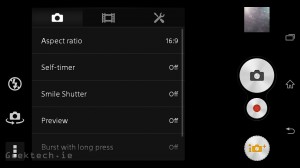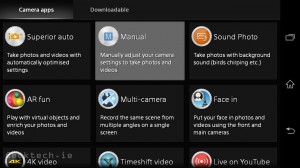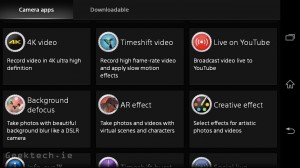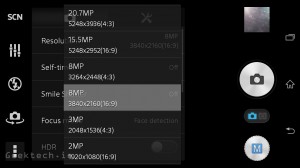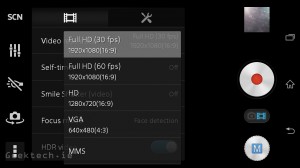Sony have been pushing out more and more smartphones over the past year. The Xperia Compact series was introduced with the Z1 Compact and we were seriously impressed with how Sony managed to bring flagship features to a smaller device. Oddly we didn’t see an Xperia Z2 model launch, but Sony have made up for it by launching the Xperia Z3 Compact along side the Xperia Z3. This gives users access to Sony’s latest features/specs in a smaller device. Let’s check out the main features of the Xperia Z3 Compact.
- Android 4.4.4 KitKat
- Display: 4.6″ 720p IPS LCD capacitive touchscreen
- Chipset: Qualcomm MSM8974AC Snapdragon 801, Quad-core 2.5 GHz Krait 400, Adreno 330
- Memory: 16GB storage, MicroSD card slot
- Rear Camera: 20.7 MP auto-focus camera, 1/2.3” Sensor, LED flash,
2160p@30fps, 1080p@30fps, 1080p@60fps, 720p@120fps - Front Camera: 2.2MP front-facing camera, 1080p@30fps
- Networking: Wi-Fi a/b/g/n/ac, Wi-Fi hotspot, DLNA, Bluetooth 4.0, NFC, standard microUSB 2.0 port, GPS/GLONASS receiver, 3.5mm audio jack
- Modem: GSM/GPRS/EDGE/UMTS/HSPA/LTE Cat 4
- Battery: 26,00mAh Li-Ion non-removable battery
- Other features: Stereo FM radio with RDS, IP68 certified – dust proof and water resistant over 1 meter and 30 minutes
- Dimensions: 127.3 x 64.9 x 8.6 mm, 129 g
Sony have done some impressive design changes over the Xperia Z1 Compact here. We have a larger battery (2,300-2,600mAh), a larger display (4.3-4.6-inches). Sony did all of this while making the actual device smaller and lighter. A worthy upgrade already, but we also have an newer chipset, better display, and 4K video support. Already we’re off to a fun start. So let’s get the ball rolling and take a look at the device.
The Xperia Z3 Compact

Much of the design on the Z3 Compact is similar to its predecessor, but also the new Xperia Z3 as well. Some changes have been made, and one of the big ones is the removal of a metal frame. Now we have hardened plastic around the device. This probably accounts for the drop in weight. The loss of Metal will dampen the premium feel of the device for some, but the IP68 certification is on board and users can still enjoy water resistance up to 30 minutes and 1 meter.
While the device lacks the metal we have seen before. The Xperia Z3 Compact still features a very solid and enjoyable build quality. It’s comfortable in hand and doesn’t give of a cheap feeling in anyway.
The added water resistance means the Nano sim card, Micro USB, and MicroSD card are accessible through removable flaps.
UI
Sony still use their own app launcher and UI. Not much has changed compared to previous Sony devices, but let’s take a look around anyway.
Most of the layout is pretty straight forward. The app launcher includes a menu system by swiping all of the way to the left. This allows for changing the order of the apps and quickly uninstalling some.
The dialpad and keyboard also have the same design and features. The launcher and keyboard are take it or leave, as with Android, you can simply install your own. That being said, we personally had no real issue with it. It’s fairly straight forward and easy to use.
Camera UI
Let’s a take a quick look at the camera UI before taking a look at some photos taking with the Xperia Z3 Compact
The main mode is Superior Auto, which pretty much handles all of the settings. Images are downscaled to 8MP and users can start recording video or take pictures from the same screen.
The Camera includes a lot different modes. The Manual mode opens up a lot of options for the camera. Here you can select the full 20.7MP resolution, turn on HDR, image stabilization and more.
The video options include 1080p@30fps, 1080p@60fps, 720p, VGA, and finally MMS size. Users can also record in 4K by selecting the specific mode first.
Photos
Since the camera app includes a lot of different modes, we have a lot of photos to take a look at. We took photos with a few different settings which are Superior Auto, Manual 20.7MP, Manual 8MP with HDR, and finally Manual 8MP with Stabilization ON. While most users will probably stick with the Superior Auto mode, the broad range of tests should cover all of the different quality settings.
Superior Auto
Full Size Images
20.7MP Manual
Full Size Images
8MP Manual with HDR
Full Sized Images
8MP manual with Stabilization
Full Sized Images
Videos
Since the Xperia Z3 Compact Camera has a good few modes to play with, we have two separate lot of videos to look at here. First up is those recorded with 1080p. Here we alternate between Normal, HDR ON and OFF, and then finally with SteadyShot turned on. There are lots of different modes that the user can play around with and pick for different needs. The other video is simply recorded with the included 4K mode. Any settings beyond default are display on the bottom right of the video.
1080p
4K
Benchmarks
Let’s take a look at some benchmark numbers for the Xperia Z3 Compact. Since the phone includes a Snapdragon 801 chipset, we’re of course going to see some top end performance.
| 3D Mark Ice Storm Unlimited | 19273 |
| Antutu 5 | 44209 |
| Geekbench 3 Single-Core | 988 |
| Geekbench 3 Multi-Core | 2734 |
| Vellamo Metal | 1565 |
| Vellamo Multicore | 1818 |
| Vellamo Browser (Chrome) | 2752 |
The performance is exactly what we expected. The Snapdragon 801 has no issues proving us with a nice smooth experience.
Gameplay
Gameplay is a great way for us to detail some real world performance of the device. The games we’re taking a look at are Dead Trigger 2, Grand Theft Auto: San Andreas, and Modern Coombat 5.
Battery Performance
We must say we’re impressed that Sony managed to include a nice large 2,600mAh battery inside the Z3 Compact. This is a pretty big step up from the 2,300mAh in the previous Z1 Compact, yet we have a lighter device with less dimensions and a larger display.
Below is our setup for our battery testing. This is aimed at a 12 hour/day usage with medium to heavy usage in mind. This gives us the ranged performance you can expect from the Z3 Compact.
| Phone Calls | 20-30 Minutes |
| Text message/Chat/Emails | Throughout the day(checking) and 20-30 sent |
| Photos | 10-20 |
| Video recording | 20-30 Minutes |
| Internet browsing | Throughout the day(around 30-40 minutes total) |
| Gaming | 30 Minutes |
| YouTube/Netflix | 30-40 Minutes |
| Connectivity | WiFi and 3G; mostly 3G |
| Screen Brightness | 50-percent |
Impressed is an understatement here. The Xperia Z3 had no problem with our medium to heavy usage day and we had over 35-percent at the end of the day. Now of course the smaller display and less pixels can account for using less power throughout the day, however the brightness was pretty good at 50-percent and bright enough for day to day usage. If we cut out the gaming, we can easily see this device lasting 2 days if needed. Perhaps with less 3g and more WiFI as well. Since the device doesn’t cut back on any high performance specs, bar the less pixels, it’s really nice to see that a smaller device can still run with the big boys with regards to battery performance.
Conclusion
We hope you enjoyed the review, but now it’s time for the conclusion. Here we break down the main aspects of a smartphone. This includes, Design, Screen, Camera, Performance and then finally our overall opinion. Let’s start
Design
The first Xperia Compact device shared its design cues from the Xperia Z1 that launched a few months beforeit. Now we have both the Xperia Z3 and Compact version launching along side. However, their designs differ somewhat. The Xperia Z3 Compact doesn’t feature the metal frame. We actually think this was the right choice. The Xperia Z3 Compact is obviously aimed at being a smaller device. The metal frame we’re guessing just added too much weight/cost and no real benefit. The design they choose is actually rather nice. The plastic frame features what Sony are calling Liquid Distortion and it really looks good. It’s of course not the nicest phone we have seen, but it no way looks bad.
In all honesty, the Xperia Z3 Compact is a premium designed device. It features slick overall look with a reflective back cover and more importantly the device is water resistant. We appreciate a nice design, but definitely prefer function over fashion and the Z3 Compact has a good bit of both.
Screen
The included 4.6-inch 720p LCD IPS display provides great colours and sharpness with an excellent white balance. The brightness levels also go high enough to make direct sunlight less of an issue. Obviously the device isn’t going to suit those looking for the best display, but since the Compact series exists for alternative reason, the display isn’t the priority. Sony did a great job in bringing a high quality display to a small screen size and we can’t imagine anyone would be disappointed with it.
Camera
Sony’s last few smartphones have included the same or nearly identical 20.7MP sensor. Since our review of the Xperia Z1 Compact, not much has changed, although we now have 4K support. Quality wise, we aren’t seeing any real improvement. This is sort of understandable due to the fact the Z1 Compact was only released at the beginning of this year.
The Z3 Compact camera can take some great shots, but we aren’t blown away by the performance. This could be due to it being identical to what we already saw with the Z1 and Z1 Compact, but also the fact we’re seeing better quality coming from the competition. Even the Galaxy Alpha, which is probably the Xperia Z3 Compacts main competitor had better colour reproduction. The quality on the Xperia Z3 is great, but not as good as we have seen and doesn’t offer much of an upgrade over the previous devices in the same series. The only reason this is a concern is because hearing the device has a 20.7MP will no doubt make people think it offers insane performance, but sadly the pixel count isn’t the most important factor for overall quality.
Performance
We didn’t expect anything less than flagship performance from the included Snapdragon 801 chipset. Takig the chipset for itself, it isn’t really anything impressive regarding the performance, simply because we have seen it countless times before. The Xperia Z3 being a much smaller device, it’s fantastic to see performance isn’t left behind and users can enjoy the same level of performance you would expect from a larger device. This counts even more with battery life and we’re over the moon with how well Sony did with regards to design and included a decent size battery with the device. This gave us way more than a day of medium to heavy usage and you can’t help but be impressed that a device of this size and weight can do it. Especially when some larger devices can’t.
Overall
At the end of the day, it really comes down to whether or not the Xperia Z3 Compact is a worthy device or not. Thankfully we can say without a doubt that it is a great device and a worthy smartphone. It offers high end specs, with a over the top performance, a great camera, and a pretty solid design. It’s hard to fault the device, as being much smaller than most of the other flagship devices on the market, one would expect some sort of drawback, but there really isn’t anything missing from the Z3 Compact. The display doesn’t have the same pixel count, but not for a second do we believe that well deeply lessen anyones experience. Mainly because the colour, white balance and brightness are excellent. Again, something we have seen larger devices fail pretty bad at.
The Xperia Z3 Compact is simply a flagship device in a smaller shell. Anyone not wanting a larger device, the Compact should be on the top of your list. We definitely recommend it and gladly award it with Gold.
Video Review











